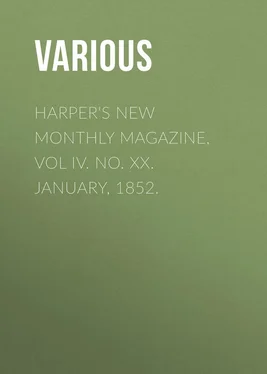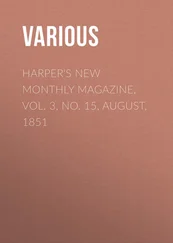Various - Harper's New Monthly Magazine, Vol IV. No. XX. January, 1852.
Здесь есть возможность читать онлайн «Various - Harper's New Monthly Magazine, Vol IV. No. XX. January, 1852.» — ознакомительный отрывок электронной книги совершенно бесплатно, а после прочтения отрывка купить полную версию. В некоторых случаях можно слушать аудио, скачать через торрент в формате fb2 и присутствует краткое содержание. Издательство: Иностранный паблик, Жанр: periodic, foreign_edu, на английском языке. Описание произведения, (предисловие) а так же отзывы посетителей доступны на портале библиотеки ЛибКат.
- Название:Harper's New Monthly Magazine, Vol IV. No. XX. January, 1852.
- Автор:
- Издательство:Иностранный паблик
- Жанр:
- Год:неизвестен
- ISBN:нет данных
- Рейтинг книги:3 / 5. Голосов: 1
-
Избранное:Добавить в избранное
- Отзывы:
-
Ваша оценка:
- 60
- 1
- 2
- 3
- 4
- 5
Harper's New Monthly Magazine, Vol IV. No. XX. January, 1852.: краткое содержание, описание и аннотация
Предлагаем к чтению аннотацию, описание, краткое содержание или предисловие (зависит от того, что написал сам автор книги «Harper's New Monthly Magazine, Vol IV. No. XX. January, 1852.»). Если вы не нашли необходимую информацию о книге — напишите в комментариях, мы постараемся отыскать её.
Harper's New Monthly Magazine, Vol IV. No. XX. January, 1852. — читать онлайн ознакомительный отрывок
Ниже представлен текст книги, разбитый по страницам. Система сохранения места последней прочитанной страницы, позволяет с удобством читать онлайн бесплатно книгу «Harper's New Monthly Magazine, Vol IV. No. XX. January, 1852.», без необходимости каждый раз заново искать на чём Вы остановились. Поставьте закладку, и сможете в любой момент перейти на страницу, на которой закончили чтение.
Интервал:
Закладка:
It was in the fall of the year 1723, that Franklin came thus to Philadelphia. He remained there during the winter, but in the spring a very singular train of circumstances occurred, which resulted in leading him back to Boston. During the winter he worked industriously at his trade, and spent his leisure time in reading and study. He laid up the money that he earned, instead of squandering it, as young men in his situation often do, in transient indulgences. He formed many useful acquaintances among the industrious and steady young men in the town. He thus lived a very contented life, and forgot Boston, as he said, as much as he could. He still kept it a profound secret from his parents where he was – no one in Boston excepting Collins having been admitted to the secret.
It happened, however, that Captain Holmes, one of Franklin’s brothers-in-law who was a shipmaster, came about this time to Newcastle, a town about forty miles below Philadelphia, and there, hearing that Benjamin was at Philadelphia, he wrote to him a letter urging him to return home. Benjamin replied by a long letter defending the step that he had taken, and explaining his plans and intentions in full. It happened that Captain Holmes was in company with Sir William Keith, the governor of the colony, when he received the letter; and he showed it to him. The governor was struck with the intelligence and manliness which the letter manifested, and as he was very desirous of having a really good printing office established in Philadelphia, he came to see Franklin when he returned to the city, and proposed to him to set up an office of his own. His father, the governor said, would probably furnish him with the necessary capital, if he would return to Boston and ask for it, and he himself would see that he had work enough, for he would procure the public printing for him. So it was determined that Franklin should take passage in the first vessel that sailed, and go to Boston and see his father. Of course all this was kept a profound secret from Mr. Keimer.
In due time Franklin took leave of Mr. Keimer and embarked; and after a very rough and dangerous passage he arrived safely in Boston. His friends were very much astonished at seeing him, for Captain Holmes had not yet returned. They were still more surprised at hearing the young fugitive give so good an account of himself, and of his plans and prospects for the future. The apprentices and journeymen in the printing office gathered around him and listened to his stories with great interest. They were particularly impressed by his taking out a handful of silver money from his pocket, in answer to a question which they asked him in respect to the kind of money which was used in Philadelphia. It seems that in Boston they were accustomed to use paper money almost altogether in those days.
Young Collins, the boy who had assisted Franklin in his escape the year before, was so much pleased with the accounts that the young adventurer brought back of his success in Philadelphia that he determined to go there himself. He accordingly closed up his affairs and set off on foot for New York, with the understanding that Franklin, who was to go on afterward by water, should join him there, and that they should then proceed together to Philadelphia.
After many long consultations Franklin’s father concluded that it was not best for Benjamin to attempt to commence business for himself in Philadelphia, and so Benjamin set out on his return. On his way back he had a narrow escape from a very imminent danger. A Quaker lady came to him one day, on board the vessel in which he was sailing to New York, and began to caution him against two young women who had come on board the vessel at Newport, and who were very forward and familiar in their manners.
“Young man,” said she, “I am concerned for thee, as thou hast no friend with thee, and seems not to know much of the world, or of the snares youth is exposed to: depend upon it, these are very bad women. I can see it by all their actions, and if thou art not upon thy guard, they will draw thee into some danger; they are strangers to thee, and I advise thee, in a friendly concern for thy welfare, to have no acquaintance with them.” Franklin thanked the lady for her advice, and determined to follow it. When they arrived at New York the young women told him where they lived, and invited him to come and see them. But he avoided doing so, and it was well that he did, for a few days afterward he learned that they were both arrested as thieves. They had stolen something from the cabin of the ship during the voyage. If Franklin had been found in their company he might have been arrested as their accomplice.
It happened curiously enough that young Franklin attracted the notice and attention of a governor for the second time, as he passed through New York on this journey. It seems that the captain of the vessel in which he had made his voyage, happened to mention to the governor when he arrived in New York, that there was a young man among his passengers who had a great many books with him, and who seemed to take quite an interest in reading; and the governor very kindly sent word back to invite the young man to call at his house, promising, if he would do so, to show him his library. Franklin very gladly accepted this invitation, and the governor took him into his library, and held considerable conversation with him, on the subject of books and authors. Franklin was of course very much pleased with this adventure.
At New York Franklin found his old friend Collins, who had arrived there some time before him. Collins had been, in former times, a very steady and industrious boy, but his character had greatly degenerated during Franklin’s absence. He had fallen into very intemperate habits, and Franklin found, on joining him at New York, that he had been intoxicated almost the whole time that he had been there. He had been gaming too, and had lost all his money, and was now in debt for his board, and wholly destitute. Franklin paid his bills, and they set off together for Philadelphia.
Of course Franklin had to pay all the expenses, both for himself and his companion, on the journey, and this, together with the charges which he had incurred for Collins in New York, soon exhausted his funds, and the two travelers would have been wholly out of money, had it not been that Franklin had received a demand to collect for a man in Rhode Island, who gave it to him when he came through. This demand was due from a man in Pennsylvania, and when the travelers reached the part of the country where this man resided, they called upon him and he paid them the money. This put Franklin in funds again, though as it was money which did not belong to him, he had no right to use it. He however considered himself compelled to use a part of it, by the necessity of the case; and Collins, knowing that his companion had the money, was continually asking to borrow small sums, and Franklin lent them to him from time to time, until at length such an inroad was made upon the trust funds which he held, that Franklin began to be extremely anxious and uneasy.
To make the matter worse Collins continued to addict himself to drinking habits, notwithstanding all that Franklin could do to prevent it. In fact Franklin soon found that his remonstrances and efforts only irritated Collins and made him angry, and so he desisted. When they reached Philadelphia the case grew worse and worse. Collins could get no employment, and he led a very dissipated life, all at Franklin’s expense. At length, however, an incident occurred which led to an open quarrel between them. The circumstances were these.
The two boys, with some other young men, went out one day upon the Delaware in a boat, on an excursion of pleasure. When they were away at some distance from the shore, Collins refused to row in his turn. He said that Franklin and the other boys should row him home. Franklin said that they would not. “Then,” said Collins. “You will have to stay all night upon the water. You can do just as you please.”
Читать дальшеИнтервал:
Закладка:
Похожие книги на «Harper's New Monthly Magazine, Vol IV. No. XX. January, 1852.»
Представляем Вашему вниманию похожие книги на «Harper's New Monthly Magazine, Vol IV. No. XX. January, 1852.» списком для выбора. Мы отобрали схожую по названию и смыслу литературу в надежде предоставить читателям больше вариантов отыскать новые, интересные, ещё непрочитанные произведения.
Обсуждение, отзывы о книге «Harper's New Monthly Magazine, Vol IV. No. XX. January, 1852.» и просто собственные мнения читателей. Оставьте ваши комментарии, напишите, что Вы думаете о произведении, его смысле или главных героях. Укажите что конкретно понравилось, а что нет, и почему Вы так считаете.












